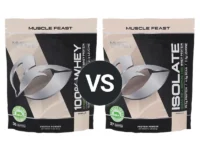Knowledge BaseYou're Questions Answered
BACK
Are all kosher protein powders also halal?
While there are similarities between kosher and halal dietary laws, not all kosher protein powders are automatically halal. Here’s an explanation of the differences and overlaps between these dietary standards and how they apply to protein powders.
Similarities Between Kosher and Halal
- Ingredient Restrictions: Both kosher and halal dietary laws restrict the consumption of certain ingredients. For instance, pork and its derivatives are prohibited in both religions1.
- Separation of Meat and Dairy: Kosher dietary laws require strict separation of meat and dairy, while halal requires similar separation between halal and haram (forbidden) products2.
- Alcohol Restrictions: Both halal and kosher standards restrict the use of alcohol and certain other intoxicating substances in food production.
Differences Between Kosher and Halal
- Certification Process: The kosher certification process requires rabbinical supervision, while halal certification requires supervision by an Islamic authority. The criteria and standards for each certification differ, resulting in products that may meet one standard but not the other3.
- Animal Slaughter Practices: Kosher and halal slaughter practices both require the animal to be conscious at the time of slaughter and for the blood to be fully drained. However, kosher requires a specific ritual performed by a shochet (trained Jewish slaughterer), while halal requires the name of Allah to be invoked before slaughter4.
- Ingredient Use: Some ingredients permitted in kosher products may not be halal. For instance, gelatin derived from non-halal sources may be kosher but not halal.
Guidelines for Finding Kosher and Halal Protein Powder
- Look for Dual Certification: Some protein powders are certified as both kosher and halal, ensuring compliance with both dietary laws.
- Check Ingredients: Review the ingredient list for any haram ingredients like gelatin.
- Consult Certification Agencies: Use lists provided by recognized halal and kosher certification agencies to identify suitable products.
Overall, while kosher and halal dietary laws have some common principles, the certification processes and specific requirements differ. Therefore, not all kosher protein powders are automatically halal. To ensure compliance, consumers should look for products that carry both kosher and halal certifications.
Was this answer helpful? Let us know!
Like
References:
- The Orthodox Union. (2021). Kosher Certification Process.
- Halal Monitoring Committee. (2022). Halal Food Guidelines.
- Star-K. (2022). Kosher vs. Halal.
- Kosher Council of America. (2022). Kosher Certification FAQs.
Add to this Answer
Related Questions
Related Reviews
Your Answer
Do you have a suggestion to improve the answer? Please detail your suggestions and provide any references to information that may support your answer if available.
The content on this site has not been written, reviewed or endorsed by a medical professional. We assume no liability for the misuse of supplements and recommend you review the label of any product, as well as consulting with your health care professional.
We are a participant in the Amazon Services LLC Associates Program, an affiliate advertising program designed to provide a means for us to earn fees by linking to Amazon.com and affiliated sites.
We are a participant in the Amazon Services LLC Associates Program, an affiliate advertising program designed to provide a means for us to earn fees by linking to Amazon.com and affiliated sites.
© 2026 ProteinPowder.com

